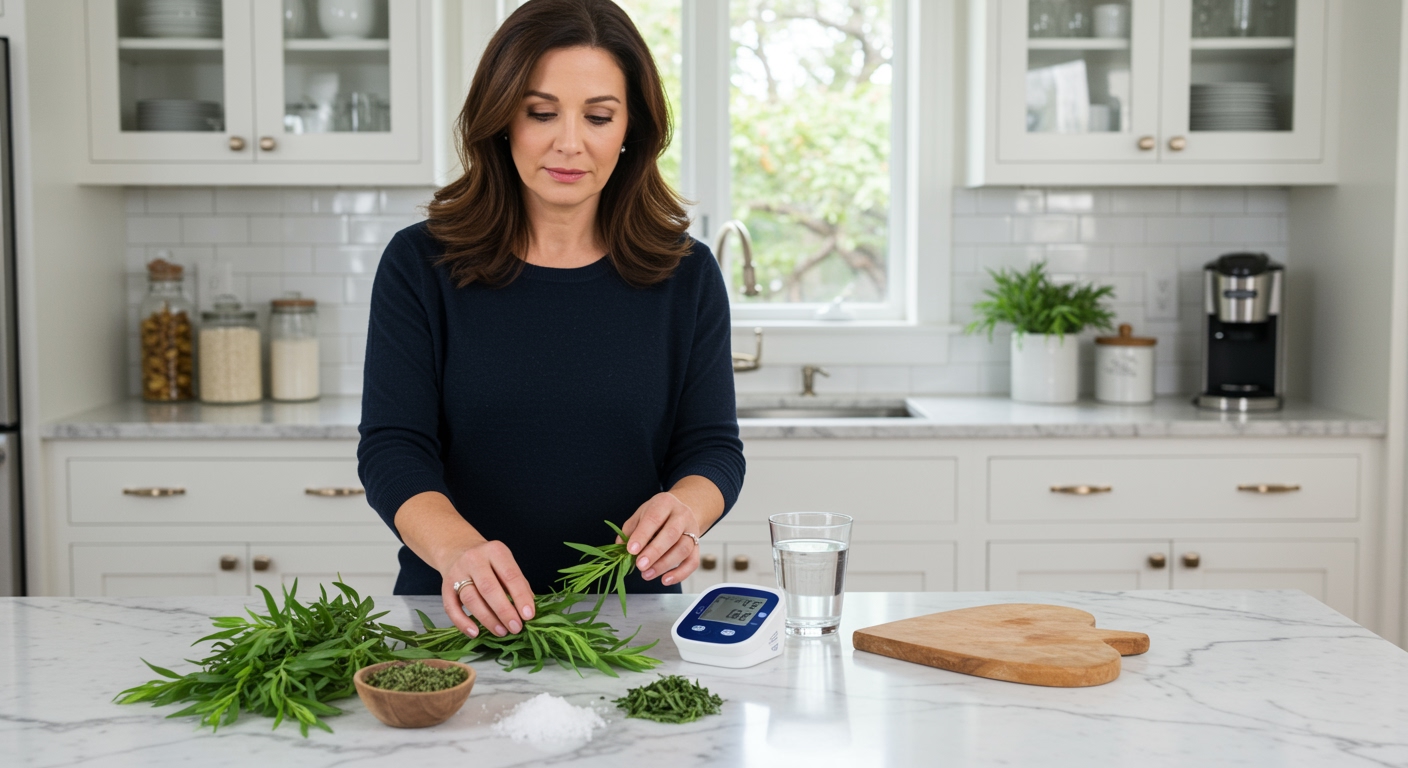✪ Key Takeaway: Low blood pressure patients can safely use tarragon in normal cooking amounts but should monitor symptoms with larger doses.
Introduction
You reach for that bottle of tarragon to season your chicken dinner and suddenly wonder if this herb could make your already low blood pressure worse.
Many people with hypotension worry about every food choice because they know certain herbs and spices can affect blood pressure levels in unexpected ways.
Hi, I’m Abdur, your nutrition coach and today I’m going to explain exactly how tarragon affects blood pressure and whether you need to avoid this popular herb.
What Does Tarragon Actually Do To Blood Pressure?
Tarragon contains compounds called flavonoids and phenolic acids that can influence your cardiovascular system in subtle ways.
Research shows that tarragon has mild vasodilatory effects, which means it can help relax blood vessel walls and potentially lower blood pressure slightly.
The herb also contains potassium, a mineral that works with sodium to regulate fluid balance and blood pressure throughout your body.
However, the blood pressure effects from normal culinary amounts of tarragon are extremely minimal and unlikely to cause significant changes in most people.
Studies on tarragon and blood pressure typically use concentrated extracts or large doses that far exceed what you would consume in everyday cooking.
✪ Fact: One teaspoon of dried tarragon contains only about 48 milligrams of potassium, which is less than 2% of your daily needs.
How Much Tarragon Is Safe For Low Blood Pressure?
Normal cooking amounts of tarragon pose no significant risk for people with low blood pressure conditions.
This typically means using one to two teaspoons of dried tarragon or a few tablespoons of fresh tarragon leaves in your meals.
The concern arises when people consume tarragon in therapeutic doses through supplements or concentrated extracts that contain much higher levels of active compounds.
Your body processes small amounts of tarragon through normal metabolic pathways without creating dramatic shifts in blood pressure regulation.
However, if you notice symptoms like increased dizziness, fatigue, or lightheadedness after consuming tarragon, you should reduce your intake and monitor your response.
People taking blood pressure medications should be more cautious because even small changes in blood pressure can interact with their prescribed treatments.
✪ Pro Tip: Keep a food diary to track how different herbs affect your energy levels and symptoms throughout the day.
What Are The Warning Signs To Watch For?
Your body will give you clear signals if tarragon or any other herb is affecting your blood pressure negatively.
Watch for increased episodes of dizziness when standing up, which indicates your blood pressure might be dropping too low.
Unusual fatigue or weakness that occurs within a few hours of eating tarragon-seasoned foods could signal that your blood pressure has dropped below optimal levels.
Some people experience nausea or lightheadedness when their blood pressure drops, especially if they already have naturally low readings.
Cold hands and feet can also indicate that your circulation is being affected by changes in blood pressure regulation.
If you experience any combination of these symptoms consistently after consuming tarragon, you should eliminate it temporarily and see if your symptoms improve.
✪ Note: Symptoms that persist or worsen require immediate medical attention regardless of their suspected cause.
Should You Avoid Tarragon Completely?
Most people with low blood pressure do not need to avoid tarragon when used in normal culinary amounts.
The herb provides beneficial nutrients including antioxidants, vitamins, and minerals that support overall health without causing dramatic blood pressure changes.
However, you should avoid tarragon supplements, concentrated extracts, or therapeutic doses unless specifically recommended by your healthcare provider.
People with severe hypotension or those taking multiple blood pressure medications should discuss tarragon consumption with their doctor before adding it to their regular diet.
The key is moderation and awareness of how your body responds to different foods and seasonings.
If you enjoy tarragon and experience no negative symptoms, there is no compelling reason to eliminate this flavorful herb from your cooking routine.
✪ Pro Tip: Start with small amounts and gradually increase to find your personal tolerance level for any new herb or spice.
The Bottom Line
Low blood pressure patients can safely enjoy tarragon in normal cooking amounts without significant concern about worsening their condition.
Smart nutrition choices come from understanding your body’s unique responses rather than avoiding foods based on fear alone.
I would love to hear about your experiences with herbs and spices in managing low blood pressure, so please share your thoughts and questions in the comments below.
References
At NutritionCrown, we use quality and credible sources to ensure our content is accurate and trustworthy. Below are the sources referenced in creating this article:
- Medical News Today: Tarragon Benefits
- Vinmec: Diet for People with Low Blood Pressure
- Healthline: Tarragon Benefits and Uses
- Healthline: Low Blood Pressure Diet





